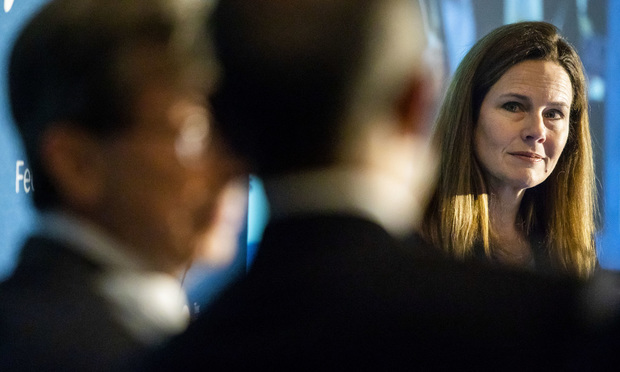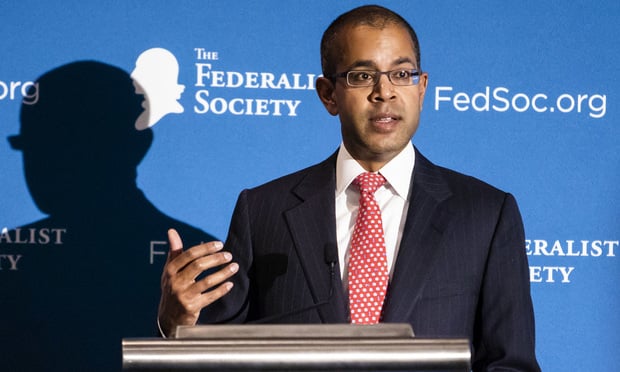The Federalist Society Forecasts the Future at Annual Convention in DC
Washington Wrap is a weekly look at the biggest legal industry news and Big Law moves shaping the legal business in Washington, D.C. Send tips and lateral moves to Ryan Lovelace.
November 16, 2018 at 06:08 PM
6 minute read
 Amy Coney Barrett, U.S. Court of Appeals for the Seventh Circuit, speaking during a panel discussion titled “The Future of the Past: Stare Decisis,” at The Federalist Society's 2018 National Lawyers Convention, held at The Mayflower Hotel in Washington, D.C., on Thursday, November 15, 2018. Photo: Diego M. Radzinschi/ALM
Amy Coney Barrett, U.S. Court of Appeals for the Seventh Circuit, speaking during a panel discussion titled “The Future of the Past: Stare Decisis,” at The Federalist Society's 2018 National Lawyers Convention, held at The Mayflower Hotel in Washington, D.C., on Thursday, November 15, 2018. Photo: Diego M. Radzinschi/ALM
Washington Wrap is a weekly look at the biggest legal industry news and Big Law moves shaping the legal business in Washington, D.C. Send tips and lateral moves to Ryan Lovelace at [email protected].
The Federalist Society's annual convention in Washington, D.C., has historically given the public a glimpse into the legal minds guiding President Donald Trump and those overseeing the federal judiciary. Given turnover at the White House counsel's office, Justice Department and the U.S. Supreme Court, the Federalist Society's 2018 convention yielded clues about who could be in line to lead government in the years to come.
It was the judges on Trump's U.S. Supreme Court shortlist who drew the biggest crowds. Williams & Connolly partner Kannon Shanmugam's warm greeting to Judge Amy Coney Barrett during Thursday's panel on stare decisis winked at her status as the perceived runner-up to Justice Brett Kavanaugh. Shanmugam was a panelist while Barrett, on the U.S. Court of Appeals for the Seventh Circuit in Chicago, moderated the event titled “The Future of the Past: Stare Decisis.”
 Kannon Shanmugam, partner with Williams & Connolly, speaking during a panel discussion titled “The Future of the Past: Stare Decisis,” at The Federalist Society's 2018 National Lawyers Convention, held at The Mayflower Hotel in Washington, D.C., on Thursday, November 15, 2018. Photo: Diego M. Radzinschi/ALM
Kannon Shanmugam, partner with Williams & Connolly, speaking during a panel discussion titled “The Future of the Past: Stare Decisis,” at The Federalist Society's 2018 National Lawyers Convention, held at The Mayflower Hotel in Washington, D.C., on Thursday, November 15, 2018. Photo: Diego M. Radzinschi/ALM “It's a particular pleasure to be here with Judge Barrett, who clerked for Justice Scalia the year before I did and who, in fact, interviewed me,” Shanmugam said Thursday. “Judge, welcome back to Washington, and I hope you'll come back for good sometime soon.” His remarks were then interrupted by loud applause.
Barrett's future as a potential justice-in-waiting was not lost on Shanmugam's fellow panelists either. Neil Eggleston, a Kirkland & Ellis partner and former White House counsel to President Barack Obama, pointedly avoided discussing high court precedent steered his way by Barrett.
“So I've also read your article, and since Kirkland is based in Chicago, I won't comment on it more than that,” Eggleston said with a smile regarding Barrett's writing on stare decisis.
Barrett also dodged issues she apparently wanted to avoid, as evidenced by her dismissal of Georgetown University Law Center professor John Baker's desire to turn the panel discussion over to her as an expert on stare decisis.
One questioner rose to ask specifically about Roe v. Wade, a Supreme Court decision permitting legal abortion, and noted that Barrett may wish to not answer the query. All eyes turned to Barrett, who stood at the head of the room where others were seated, including Leonard Leo, a Trump adviser on the Supreme Court and judiciary, and Americans United for Life senior counsel Clarke Forsythe.
“Kannon?” Barrett said, routing Roe to her fellow former Scalia law clerk.
“Why me?” Shanmugam proffered with a smile, drawing laughter from the crowd listening over lunch.
Thursday's events were also notable because of Kavanaugh's presence. Kavanaugh did not speak at the convention but attended a dinner at Union Station alongside more than 2,000 guests. A Federalist Society source told The National Law Journal that Kavanaugh will speak at next year's conference.
In 2017, Attorney General Jeff Sessions and White House counsel Don McGahn delivered remarks during the conference, and Justice Neil Gorsuch delivered an address over dinner at Union Station. Sessions and McGahn no longer work for the Trump administration and no Supreme Court justice spoke at this year's events.
McGahn did talk with Senate Majority Leader Mitch McConnell this year about the judicial selection process as conference-goers dined, including Sessions and his replacement in acting U.S. Attorney General Matt Whitaker, new White House Counsel Pat Cipollone, and four Supreme Court justices. The duo reminisced about their accomplishments together, while McConnell indicated he had more goals left on his checklist.
“My goal is to do everything we can, as long as we can, to transform the federal judiciary,” McConnell said.
Law Firm Moves, News and Notes
Wiley Rein elected six new partners from within its own ranks, who were previously associates and counsels.
Stephanie Bell, Edgar Class, Matthew Gardner, Ari Meltzer, Richard O'Keeffe Jr., and Karen Toto will become partners Jan. 1, 2019, and Usha Neelakantan will become of counsel. The new partners work across Wiley's practices, including international trade; telecom, media & technology; white collar defense & government investigations; privacy & cybersecurity; government contracts; and insurance.
Gibson, Dunn & Crutcher is creating a new betting and gaming practice group in response to the Supreme Court's decision in Murphy v. National Collegiate Athletic Association that handed New Jersey a victory in its effort to legalize sports betting. The group will be led by three partners, Kevin Masuda in Los Angeles, Jonathan Earle in London, and Graham Winter in Hong Kong.
“Since our firm succeeded in persuading the U.S. Supreme Court to strike down the federal limits on sports gambling in the U.S., we have seen activity in the sector take off,” said Ken Doran, Gibson Dunn chairman and managing partner, in a statement. “The new Betting and Gaming Practice Group will allow us to focus on the needs of our clients in a more coordinated, efficient, and effective manner.”
Sandra Grossman and Becki Young announced they merged their immigration practices to form Grossman Young & Hammond in suburban Washington, D.C.
The female-led firm maintains offices in the Maryland suburbs of Washington and has nine total attorneys and 22 total staffers.
Speaking of the suburbs, Amazon's HQ2 is coming to a Northern Virginia city just outside of Washington, D.C. Some lobbyists have already begun angling for new work created by Amazon's forthcoming expanded presence in Crystal City, especially as it makes a play for the Pentagon's multibillion-dollar cloud-computing contract dubbed “JEDI Cloud.”
This content has been archived. It is available through our partners, LexisNexis® and Bloomberg Law.
To view this content, please continue to their sites.
Not a Lexis Subscriber?
Subscribe Now
Not a Bloomberg Law Subscriber?
Subscribe Now
NOT FOR REPRINT
© 2025 ALM Global, LLC, All Rights Reserved. Request academic re-use from www.copyright.com. All other uses, submit a request to [email protected]. For more information visit Asset & Logo Licensing.
You Might Like
View All

Law Firms Expand Scope of Immigration Expertise Amid Blitz of Trump Orders
6 minute read
Am Law 100 Lateral Partner Hiring Rose in 2024: Report
Trending Stories
- 1Uber Files RICO Suit Against Plaintiff-Side Firms Alleging Fraudulent Injury Claims
- 2The Law Firm Disrupted: Scrutinizing the Elephant More Than the Mouse
- 3Inherent Diminished Value Damages Unavailable to 3rd-Party Claimants, Court Says
- 4Pa. Defense Firm Sued by Client Over Ex-Eagles Player's $43.5M Med Mal Win
- 5Losses Mount at Morris Manning, but Departing Ex-Chair Stays Bullish About His Old Firm's Future
Who Got The Work
J. Brugh Lower of Gibbons has entered an appearance for industrial equipment supplier Devco Corporation in a pending trademark infringement lawsuit. The suit, accusing the defendant of selling knock-off Graco products, was filed Dec. 18 in New Jersey District Court by Rivkin Radler on behalf of Graco Inc. and Graco Minnesota. The case, assigned to U.S. District Judge Zahid N. Quraishi, is 3:24-cv-11294, Graco Inc. et al v. Devco Corporation.
Who Got The Work
Rebecca Maller-Stein and Kent A. Yalowitz of Arnold & Porter Kaye Scholer have entered their appearances for Hanaco Venture Capital and its executives, Lior Prosor and David Frankel, in a pending securities lawsuit. The action, filed on Dec. 24 in New York Southern District Court by Zell, Aron & Co. on behalf of Goldeneye Advisors, accuses the defendants of negligently and fraudulently managing the plaintiff's $1 million investment. The case, assigned to U.S. District Judge Vernon S. Broderick, is 1:24-cv-09918, Goldeneye Advisors, LLC v. Hanaco Venture Capital, Ltd. et al.
Who Got The Work
Attorneys from A&O Shearman has stepped in as defense counsel for Toronto-Dominion Bank and other defendants in a pending securities class action. The suit, filed Dec. 11 in New York Southern District Court by Bleichmar Fonti & Auld, accuses the defendants of concealing the bank's 'pervasive' deficiencies in regards to its compliance with the Bank Secrecy Act and the quality of its anti-money laundering controls. The case, assigned to U.S. District Judge Arun Subramanian, is 1:24-cv-09445, Gonzalez v. The Toronto-Dominion Bank et al.
Who Got The Work
Crown Castle International, a Pennsylvania company providing shared communications infrastructure, has turned to Luke D. Wolf of Gordon Rees Scully Mansukhani to fend off a pending breach-of-contract lawsuit. The court action, filed Nov. 25 in Michigan Eastern District Court by Hooper Hathaway PC on behalf of The Town Residences LLC, accuses Crown Castle of failing to transfer approximately $30,000 in utility payments from T-Mobile in breach of a roof-top lease and assignment agreement. The case, assigned to U.S. District Judge Susan K. Declercq, is 2:24-cv-13131, The Town Residences LLC v. T-Mobile US, Inc. et al.
Who Got The Work
Wilfred P. Coronato and Daniel M. Schwartz of McCarter & English have stepped in as defense counsel to Electrolux Home Products Inc. in a pending product liability lawsuit. The court action, filed Nov. 26 in New York Eastern District Court by Poulos Lopiccolo PC and Nagel Rice LLP on behalf of David Stern, alleges that the defendant's refrigerators’ drawers and shelving repeatedly break and fall apart within months after purchase. The case, assigned to U.S. District Judge Joan M. Azrack, is 2:24-cv-08204, Stern v. Electrolux Home Products, Inc.
Featured Firms
Law Offices of Gary Martin Hays & Associates, P.C.
(470) 294-1674
Law Offices of Mark E. Salomone
(857) 444-6468
Smith & Hassler
(713) 739-1250









